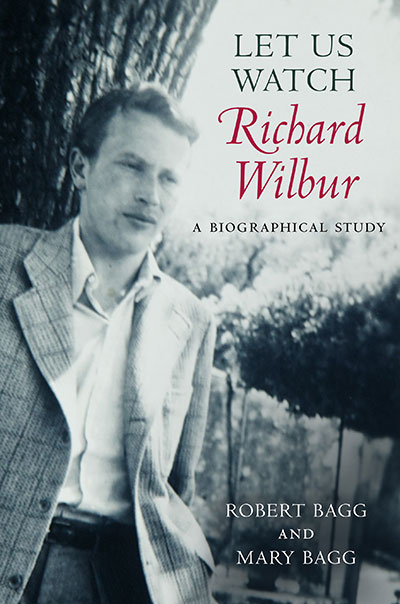Amherst has a remarkable record as a poet’s town, and one of its stateliest figures is Richard Wilbur ’42, a standard-bearer of his generation, who died Oct. 15 at the age of 96. (See “The Splendor of Mere Being,” page 38.) In his book Shelf Life, the critic William Pritchard ’53, an early and ongoing champion of Wilbur’s modern formalisms, recalls looking forward to Wilbur’s readings in a 1950s Cambridge scene that included Graves, Moore and Lowell. Numerous poetry volumes, two children’s books, two Pulitzers and many celebrated translations later, Wilbur rightfully earned critic David Orr’s affectionate moniker “Grand Old Man of American Poetry.”
Let Us Watch traces Wilbur’s process of becoming grand, compiling a decade of interviews with the poet and his late wife, Charlee, as well as consulting Wilbur’s reviews, diaries, letters and ephemera. We wend from his childhood as the son of a freelance artist in New Jersey, to Amherst years writing Student editorials at the prelude to World War II.*
We follow his deployment to do radio work in the army in France and Italy. We follow trips to 1950s Paris, where he watched Molière plays and made friends with artist Alberto Giacometti. Wilbur’s was a beautiful artist’s life, perhaps quintessentially so, complete with years at the American Academy in Rome and letters traded with Elizabeth Bishop, James Merrill ’47 and Ralph Ellison.
It was a lucky life in other ways as well. Wilbur earned a fair income from his translations of Molière plays, particularly a translation of The Misanthrope that became the era’s standard. Royalties allowed the Wilburs to live comfortably, while verse translation seems to have been a good fit for Wilbur’s own sense of formal, courtly wit. Indeed, Wilbur espoused a gentlemanly ideal in his own life.
The life was not without hardships. These included having a schizophrenic brother and an autistic son—both in eras before accurate diagnosis and clear medical treatment options were available. Wilbur and Charlee went through a period of overwork and overconsumption of sedatives and alcohol. But all in all, Wilbur lived with greater luck than many of his poetic colleagues. This brings up a question: Might his gentlemanliness—in art, especially—render his poetry a bit “suburban,” as Horace Gregory once charged?
Indeed, if Wilbur long served as a poetic grandfather to Amherst, there are also parts of this biography that now need some grandfathering in. It is hard not to hear tone-deaf moments in such phrases as, “He never felt an impulse to write confessional poetry; he sensed that the genre was undignified for a man who believes that complaining, by its nature, is a weakness.” (Is exploring the personal necessarily a form of complaint? What is wrong with weakness, in a literary sense? )

It is harder still not to wince at a passage that describes Wilbur’s mother as socially ambitious, noting that “her driven nature backfired” when “she was sidelined by exhaustion after a miscarriage.”
Indeed, Wilbur lived a certain kind of privileged life. He also wrote good poems and books that are sure to endure among readers. Wilbur also embodied a life spent making—at a scale and with a consistency most working artists never reach.
After reading the book I found myself thinking again of the student* turned poet whose first real sojourns to Europe were as a soldier, watching bodies die and the world erupt. At Amherst, on the outbreak of war, Wilbur urged fellow students to suppress their doubts and confine their thoughts to “the post war world which it will be our great pleasure to put together.”
Perhaps his rootedness in lyric tradition had to do with a lifelong dedication to attempting to forge some version of a durable modernism, one that would never again need to shatter.
Sometimes we are of course shattered, and sometimes we do need to reinvent. But Wilbur’s guiding charge to reassemble the durable is also deep: in life and in art we continue to need vessels that can last, sustain and hold.
*These two sentences have been corrected from the original to remove the mistaken impression that Wilbur was a conscientious objector, a phrase he never applied to himself.
Tess Taylor ’00 is the author of Work & Days, which The New York Times named one of 2016’s best books of poetry.
